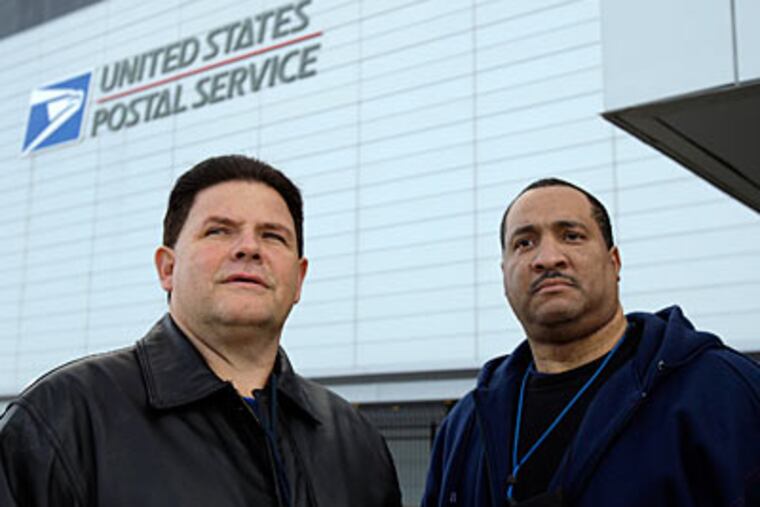Office snooping pays off
Postal worker uncovered mail madness

THE ANNOUNCEMENT in late August that the U.S. Postal Service planned to transfer 162 mail clerks made no sense to veteran postal worker Nick Casselli.
With hundreds of overflowing unsorted mail bins blocking passageways at the Southwest Philadelphia processing plant and a yearlong ban on overtime, Caselli said, he knew there weren't enough clerks to process the daily mail.
As a new shop steward, Casselli set out to find out why. Using the "eyes and ears" of co-workers, Casselli was first to uncover the Philadelphia post office's dirty little secret.
"I was shocked," he said.
Senior managers allegedly were ordering clerks to undercount the daily mail volume, reroute trailers of unsorted mail and change the color codes to make it appear that mail was not late, according to a complaint filed by the American Postal Workers Union Local 89.
"Once he uncovered it and brought it to me, the investigation took off," said Gwen Ivey, Local 89 president.
On Dec. 5, regional manager Frank Neri, who the union believes was the architect of cost-saving changes gone bad, was replaced with former Philadelphia Postmaster Jim Gallagher, an operations specialist.
"The management changes in Philadelphia are clearly a result of the Postal Service responding to the Daily News exposing mismanagement," said Ivey.
"Now, they need to stop giving managers bonuses for cutting service to the point that mail can't be processed," she added. "Otherwise, money wins and people lose."
Last week, federal agents from the Office of Inspector General opened a criminal probe, in addition to a mail audit that is expected to take at least two months.
"My sense is that the misconduct in Philadelphia crossed a number of lines," said the union's attorney, Nancy B. Lassen. "Hopefully, the responses that we are now seeing are sincere and will not stop until the problems are corrected, and the wrongdoers have been dealt with appropriately."
Months ago, Casselli's snoops began to look around the plant. They noticed some tractor-trailers filled with unsorted mail rerouted so that the mail couldn't be counted.
Magazines were stacking up, business-reply envelopes were left unsorted and bins of waste mail multiplied, with workable mail inside, according to postal workers.
There was so much mail, postal workers couldn't process it all each day, and overtime was banned.
By early September, mail bins blocked passageways, making it impossible to reach the waste bins behind them, let alone verify if first-class mail was inside, a supervisor told the Daily News.
But when Neri complained that he wasn't getting his monthly Nascar magazine, a clerk tracked it down and put it on the next delivery truck, postal workers said.
Ivey turned to the union's attorney for help. Lassen took signed statements from postal workers of what they saw, or were directed to do by supervisors and managers.
Independently, the Daily News had been interviewing customers about mail problems.
The Boothwyn Fire Company lost about $6,000 during its annual fundraising drive because its business-reply envelopes were not returned.
By early October, the Daily News received a tip about the union's inquiry. Reporters then interviewed postal workers and a supervisor and reviewed Postal Service documents, including daily-mail-volume reports, which supported the postal workers' claims of allegedly undercounting the mail.
On Oct. 24, Lassen filed a complaint with the Postal Service's Office of Inspector General, which described the alleged undercounting of the mail, changing of color codes to prevent the mail from appearing late, and destruction of mail.
According to the complaint, managers, who directed the alleged undercounting and other issues, received bonuses based on the falsification of postal documents.
After the World Series and the election, the Dec. 1 Daily News story of the mail fiasco touched a nerve with the public. Hundreds of calls, e-mails and messages poured into the newspaper, describing heartbreaking accounts of delayed and missing mail - and of postal workers upset they couldn't deliver the mail on time.
Among them was Malik, 40, an immigrant who declined to give his last name. He desperately wanted to visit his sick parents in Africa. In February, he paid $385 for an immigrant passport so he could return to the United States. Malik said authorities confirmed his passport was mailed Sept. 9, but he never received it.
In November, he reapplied, paying another $385. He still hasn't seen his parents or his passport.